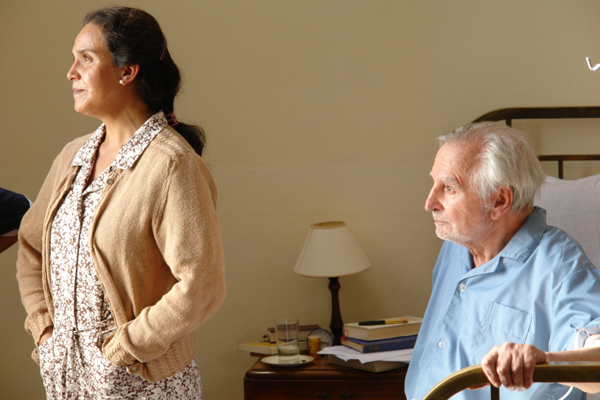|

Reviews of Recent Independent, Foreign, & Documentary Films
in Theaters and DVD/Home Video

THE WINDOW
Directed by
Carlos Sorín
Written by
Sorín & Pedro Mairal
Released by
Film Movement
Spanish with English subtitles
Argentina/Spain. 85 min. Not
Rated
With Antonio Larreta, María del Carmen Jiménez, Emilse Roldán, Arturo
Goetz, Jorge Diez, Carla Peterson, Luis Luque & Roberto Rovira
Argentinean director Carlos Sorín (Intimate Stories) cites
Ingmar Bergman as a major influence on The Window. In particular,
he describes his first viewing of Wild Strawberries (1957),
Bergman’s film about an elderly professor who reflects upon his life
choices and struggles to validate his existence. “This movie was a
transition in my life as spectator,” Sorín explains. “From then on, I
progressively started getting interested in a different cinema, the
cinema ‘for adults’.”
What he’s saying is that Bergman was “serious.” Thomas Pynchon once
wrote: “When we speak of ‘seriousness’ in fiction, ultimately we are
talking about an attitude toward death.” Few directors were more
death-obsessed than Bergman, and what undoubtedly fascinated Sorín was
Bergman’s unabashed willingness to take on death as a theme. The
Window certainly shares traits with Wild Strawberries. Both
feature a man near death haunted by memories of the past, and both
include sequences of the protagonist wandering among picturesque open
spaces. Like Bergman, Sorín is fascinated by the human face and spares
no opportunity for an expressive close-up.
What’s missing, however, is Bergman’s portentousness, his cold, brooding
insistence on doomsdaying. It’s no surprise that Sorín was drawn to
Wild Strawberries—one of Bergman’s least pessimistic films—because
there is more humor and all-around warm fuzziness in The Window
than Bergman could ever muster. Sorín is fascinated by Bergman’s
death-obsession, but in a life-affirming kind of way.
You could glean that just from the opening credits, during which a lush
waltz scored for pizzicato strings, bassoon, and English horn floods the
soundtrack. In the remote countryside, bedridden 80-year-old Antonio
(played by noted Uruguayan writer Antonio Larreta) lives alone, except
for a host of servants. His loneliness is represented Bergman-style by
the initially oppressive ticking of two clocks. But as Sorín lingers on
the clocks, we hear that the ticks’ intervals are slightly out of sync
with one another, producing a hypnotic rhythmic motif; the oppressive
becomes playful.
Antonio eagerly anticipates a visit from his estranged son (Jorge Diez),
a renowned pianist. He wants everything to be perfect, so he has a piano
tuner (Alberto Ledesma) come to examine the downstairs upright, which
hasn’t been played in some time. (The piano, incidentally, provides some
delicious sonic interludes, much like last year’s The Silence Before
Bach by Catalan filmmaker Pere Portabella. Audiophiles rejoice!)
While at work, the piano tuner—a jovial, hirsute middle-aged man—flirts
with one of Antonio’s servants and expounds upon the virtues of rural
life. He also unwittingly serves as Antonio’s accomplice in defying
doctor’s orders when he allows Antonio to leave the house and wander
willy-nilly about the Pampas. This results in some expertly composed
panoramic shots that not only convey the beauty of Antonio’s
surroundings, but also give an external, man-dwarfed-by-nature
manifestation to Antonio’s struggle with mortality.
There's a palpable sadness to these images, and Sorín doesn't deny that
spending late life in such isolation has its tragic dimensions. But
Sorín also can’t resist injecting his zest for life. Sure, the sight of
an octogenarian wandering about nature, IV bag still in hand, is pretty
heartbreaking. But its sheer absurdity is also endearing, even
inspiring. If this were Bergman, Antonio’s efforts would be a pitifully
futile protest against death’s (or, since this is Bergman, Death’s)
inevitability. For Sorín, however, Antonio maintains his dignity and
stakes claim to what little life he has left.
It’s to the director’s credit that he can treat death with necessary
gravity, and yet, at the same time, deftly weave in such effervescence,
such unsentimental humanity. By the time his son arrives, we hope
Antonio will have achieved some kind of peace. What happens may surprise
you. Rich Zwelling
May 6, 2009
Home
About
Film-Forward.com Archive of Previous
Reviews
Contact
us
|


